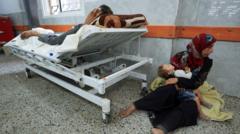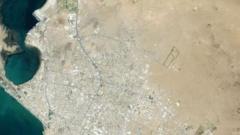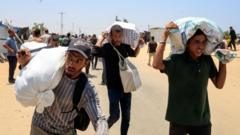Despite a military call for international help, relief efforts are hampered by logistical challenges and fear amidst ongoing conflict.
Earthquake Devastation in Myanmar and Thailand: The Struggle for Aid

Earthquake Devastation in Myanmar and Thailand: The Struggle for Aid
A powerful earthquake has left Myanmar and Thailand grappling with destruction and a fight for essential resources.
In the aftermath of a catastrophic earthquake that struck Myanmar on March 28, the country's military government temporarily signaled for international assistance and imposed a cease-fire in ongoing civil conflicts. However, the reality on the ground tells a different story, with relief aid slow to arrive, and fears surrounding military actions complicating the situation.
Reports indicate that over 3,500 lives have been lost, many buildings and historic sites have been destroyed, and the full assessment of damage remains difficult due to ruined infrastructure and disrupted communication channels. Foreign volunteers, including those from the French nonprofit L’Espoir du peuple A.R.S.I, faced significant hurdles upon arriving in Yangon, where immigration delays prevented them from participating in search and rescue efforts, which were abruptly declared over a day after their arrival.
Despite the military’s unexpected call for help and the cease-fire announcement aimed at easing tensions with rebels, aid organizations have voiced concerns about the junta restricting and delaying critical supplies and support. On-the-ground testimonies highlight the increasingly grim reality; volunteers reported aggressive military response efforts, including airstrikes, that exacerbate the prevailing sense of dread.
Moreover, with roads severely damaged and communication severely impaired, many areas remain isolated, crushing hopes for a swift recovery. The ramifications of this disaster echo deeply in a nation still reeling from political and civil strife, as discussions about the unrelenting challenges continue to gain momentum.
Reports indicate that over 3,500 lives have been lost, many buildings and historic sites have been destroyed, and the full assessment of damage remains difficult due to ruined infrastructure and disrupted communication channels. Foreign volunteers, including those from the French nonprofit L’Espoir du peuple A.R.S.I, faced significant hurdles upon arriving in Yangon, where immigration delays prevented them from participating in search and rescue efforts, which were abruptly declared over a day after their arrival.
Despite the military’s unexpected call for help and the cease-fire announcement aimed at easing tensions with rebels, aid organizations have voiced concerns about the junta restricting and delaying critical supplies and support. On-the-ground testimonies highlight the increasingly grim reality; volunteers reported aggressive military response efforts, including airstrikes, that exacerbate the prevailing sense of dread.
Moreover, with roads severely damaged and communication severely impaired, many areas remain isolated, crushing hopes for a swift recovery. The ramifications of this disaster echo deeply in a nation still reeling from political and civil strife, as discussions about the unrelenting challenges continue to gain momentum.





















